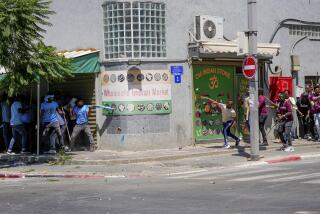Ethiopia, Eritrea Return to Open War in 2-Year Conflict
- Share via
ADDIS ABABA, Ethiopia — Ignoring international pleas to end their two-year border conflict, Ethiopia and Eritrea returned to open war Friday, with fighting reported on three fronts.
U.N. Secretary-General Kofi Annan predicted “a very brutal war” and expressed frustration that peace efforts had failed.
The two sides issued contradictory statements about the fighting, but both agreed that war had erupted once again along the 620-mile frontier, which includes a now-evacuated stretch of fertile land in this drought-racked African region.
A resumption in the two-year war had been rumored in both capitals, Addis Ababa and Asmara, for days, even as Richard Holbrooke, U.S. ambassador to the United Nations, and six other Security Council representatives urged leaders of both countries not to return to a “senseless” war.
Speaking Friday in Munich, Germany, Holbrooke accused Ethiopia and Eritrea--two of the world’s poorest countries--of “stupidity” for whipping up relatively minor disputes out of national pride and of “cruel disregard for the interests of the people.”
Eritrea blamed its much larger neighbor for initiating Friday’s clashes. For its part, Ethiopia, which has accused Eritrea of starting previous military conflicts, did not say who started the latest round.
Ethiopia said its forces--supported by tanks, artillery and aircraft--made major gains, bombing “strategic military targets” inside Eritrea and capturing enemy troops and weapons. Government spokeswoman Salome Tadesse said the Eritreans suffered heavy losses.
In Eritrea, however, an advisor to Eritrean President Isaias Afwerki, said by telephone that the claims were “a lot of rubbish” and denied that there had been any bombing.
The advisor, Yemane Gebremeskel, said the Ethiopians had been “unable to advance an inch.”
The fighting was concentrated along three fronts shared by the two countries--Badme and Zalambessa, both north of Addis Ababa; and Bure, west of Eritrea’s Red Sea port of Assab. Zalambessa, in Eritrean control, is a valuable fertile area.
More to Read
Sign up for Essential California
The most important California stories and recommendations in your inbox every morning.
You may occasionally receive promotional content from the Los Angeles Times.













